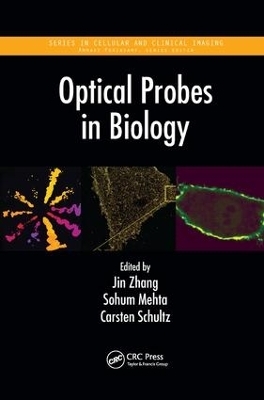
Optical Probes in Biology
CRC Press (Verlag)
978-1-138-19993-4 (ISBN)
The book examines the use of optical probes to detect and track numerous molecular processes in living cells, including GTPase and kinase activities, membrane lipids, voltage, metal ions, metabolic signals, RNA, and histone modifications. It critically reviews the different probe designs and delves into the strategies for developing new fluorescent protein varieties with enhanced capabilities. It also covers sophisticated imaging techniques and equipment, such as intensity and lifetime-based fluorescence microscopy methods, used to visualize and track optical probes.
In addition, the book goes beyond live-cell tracking to discuss the growing application of activity-based probes for performing pharmacological drug screening and probing molecular processes in living animals. It also discusses emerging techniques that are expanding optical probe-based approaches into new biological frontiers.
With contributions from top international scientists, this book offers a thorough overview of the latest optical probes in cell biology and biochemistry. Both newcomers and established researchers will discover how to incorporate state-of-the-art optical probes and fluorescence imaging into their research.
Dr. Jin Zhang is a professor of pharmacology, neuroscience, and oncology in the Johns Hopkins University School of Medicine with a joint appointment in the Department of Chemical and Biomolecular Engineering in the Johns Hopkins University Whiting School of Engineering. She has received the American Heart Association National Scientist Development Award, the Biophysical Society Margaret Oakley Dayhoff Award, the National Institutes of Health Director’s Pioneer Award, the American Society for Pharmacology and Experimental Therapeutics John J. Abel Award in Pharmacology, and the American Chemical Society Pfizer Award in Enzyme Chemistry. She was elected a fellow of the American Association for the Advancement of Science (AAAS) in 2014. Dr. Sohum Mehta is a postdoctoral fellow at the Johns Hopkins University School of Medicine, where he is using genetically encoded biosensors to investigate the spatiotemporal mechanisms of calcineurin in living cells and developing novel genetically encoded tools to study intracellular signaling. Dr. Carsten Schultz is a senior scientist at the European Molecular Biology Laboratory in Heidelberg, Germany. He is a member of the German Center for Lung Research. His research focuses on the manipulation and visualization of intracellular signaling networks, with a strong emphasis on lipid and membrane signaling as well as the use of optical probes in translational research. He has received the Heidelberg Molecular Life Science Award and the MRN Innovation Award.
Introduction and Basics. Tracking: Sensors for Tracking Biomolecules. Beyond Live-Cell Tracking: Sensors for Diverse Applications. Emerging Techniques. Index.
| Erscheinungsdatum | 12.07.2017 |
|---|---|
| Reihe/Serie | Series in Cellular and Clinical Imaging |
| Zusatzinfo | 13 Tables, black and white; 85 Illustrations, black and white |
| Verlagsort | London |
| Sprache | englisch |
| Maße | 156 x 234 mm |
| Gewicht | 839 g |
| Themenwelt | Medizin / Pharmazie ► Physiotherapie / Ergotherapie ► Orthopädie |
| Naturwissenschaften ► Physik / Astronomie ► Angewandte Physik | |
| Naturwissenschaften ► Physik / Astronomie ► Optik | |
| Technik ► Medizintechnik | |
| ISBN-10 | 1-138-19993-1 / 1138199931 |
| ISBN-13 | 978-1-138-19993-4 / 9781138199934 |
| Zustand | Neuware |
| Informationen gemäß Produktsicherheitsverordnung (GPSR) | |
| Haben Sie eine Frage zum Produkt? |
aus dem Bereich


